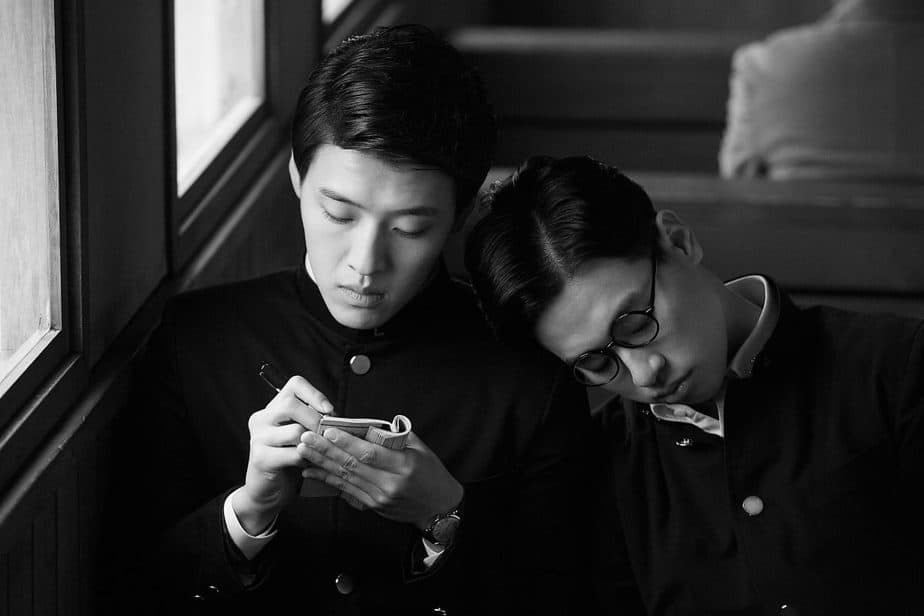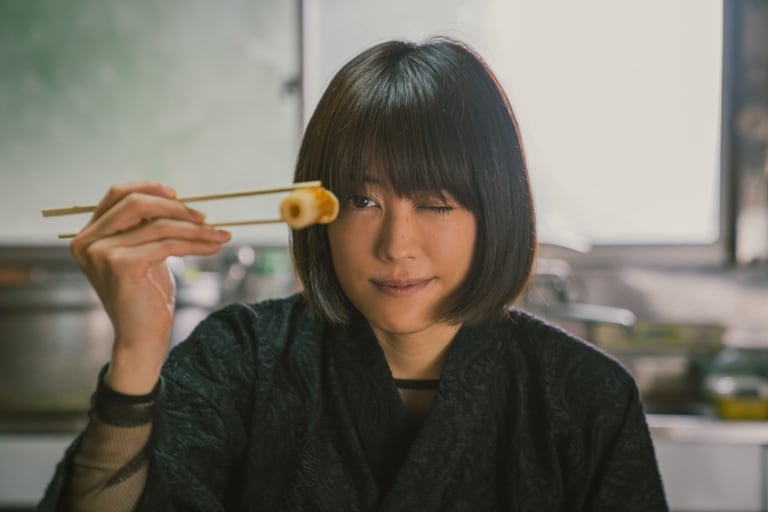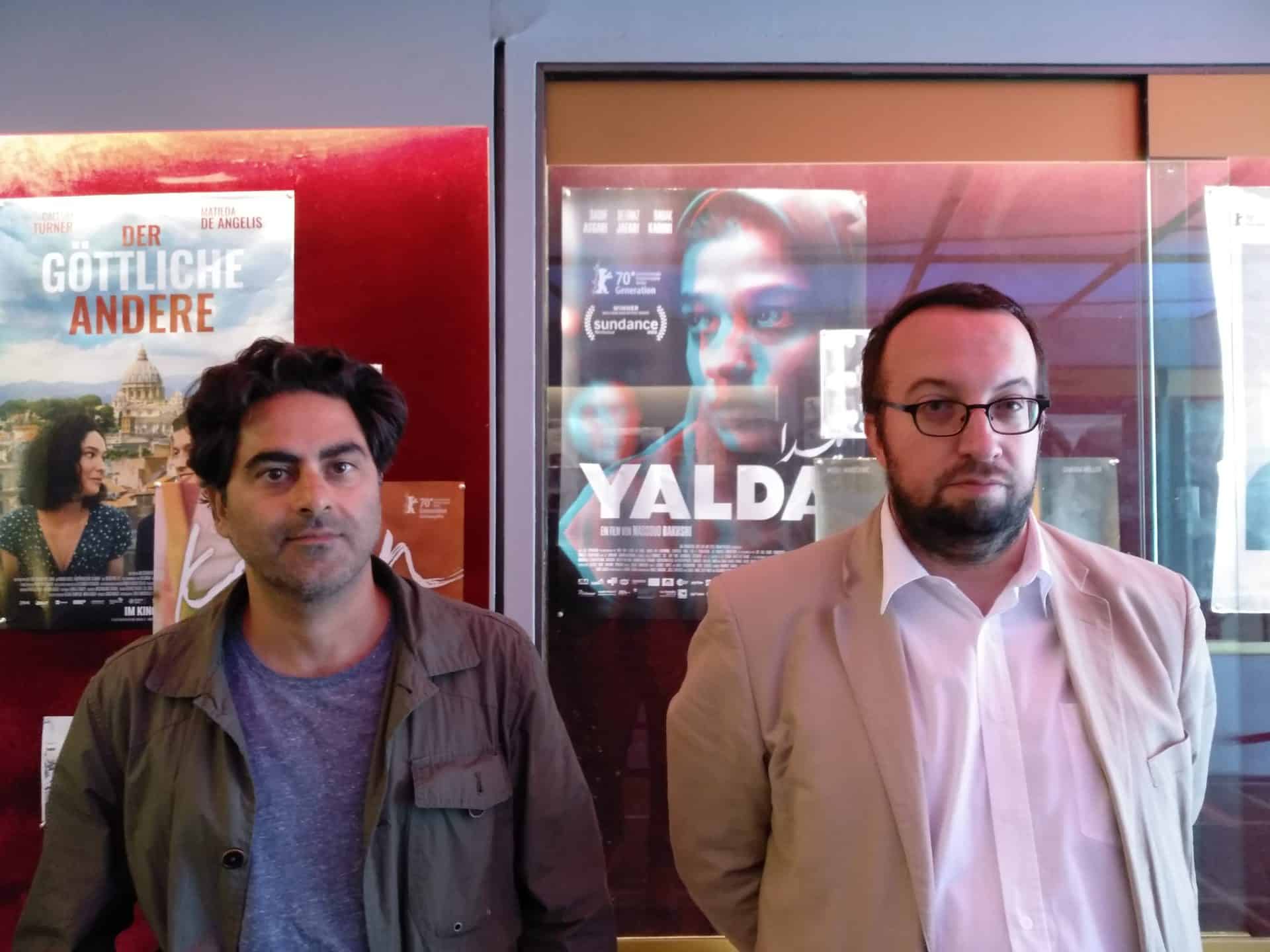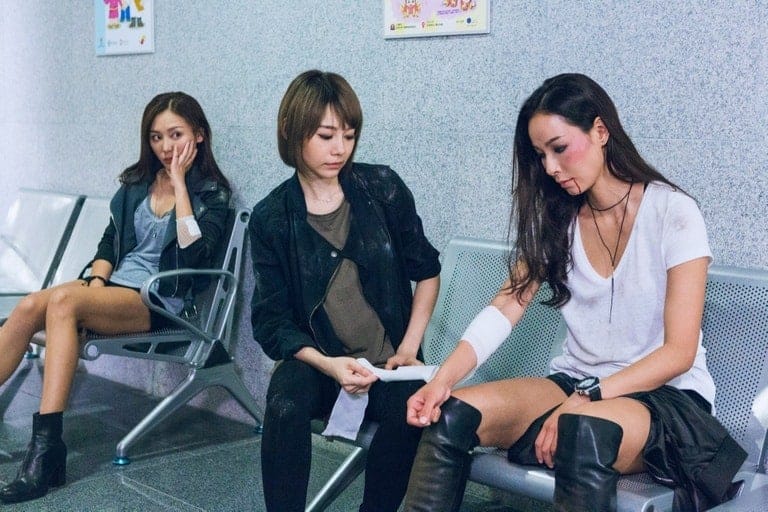John Hsu (1981, Taiwan) obtained his master's degree in the department of Radio, Television and Film at Shih Hsin University. His first TV film, Real Online, was awarded Best Fiction Film at the 2005 South Taiwan Film & Video Festival. It also earned him the Best Director Award at Golden Bell Awards, the biggest television award in Taiwan. Hsu is co-founder of AFK PL@YERS, the biggest machinima production group in Taiwan. Several of his short films have previously screened at IFFR. “Detention” is his first feature film, and it was nominated for twelve prizes at the 56th Golden Horse Awards and won five, including Best Adapted Screenplay, shared by Fu Kai-ling, Chien Shih-keng, and Hsu, as well as Best New Director for Hsu. The film has been banned in mainland China, but enjoyed strong box office success in Taiwan and Hong Kong.
On the occasion of “Detention” screening at the New York Asian Film Festival, we speak with him about adapting a video game, the White Terror period and its consequence for Taiwanese people, Gingle Wang, the cinematography and the editing, and many other topics.

Why did you decide to adapt a video game to the big screen? Have you played the game beforehand?
I have been a gamer since I was 10, essentially I have been playing video games my whole life. It is quite rare to see a Taiwanese video game like “Detention”, which also tackles Taiwanese history. I remember some years ago, when I finished the game during its release state I was really surprised, because I expected it to be another psycho-horror one that only uses history as its background. However, the story was really powerful and beautifully written, and I became something like a preacher to my filmmaker friends, insisting that someone should adapt this game into a movie. In the end, they ended up asking me if I wanted to be that someone. (laughs) This is how I got into this project.
What was the biggest difficulty in adapting?
It was really challenging adapting it to a film. We actually have many examples of people trying to adapt video games but failing during the process; therefore, we spent a lot of time thinking about the way the game told its story and what we should do to make it fit the film narrative. Because the way of telling the story is fundamentally different between the two mediums. For example, in the game, the player picks up some documents and letters, and solves puzzles for the most part, in essence collects fragments of the story, with the purpose of figuring it out completely on his/her own by the end of the game. You cannot do that in a movie, so we needed to figure out the essence of the story and reconstruct it in a way suitable for a film. That took us a lot of time during the script-writing process; we wrote the script for more than a year and the structure was actually changing even during the editing process. It was a constant back and forth to figure out how to tell the story in a new way but also being faithful to the original material.
Did it make it easier to raise the funds for the film, the fact that it was based on a video game?
It is actually the very first Taiwanese film that is adapted from a video game, so we never had this experience before and the investors did not know how it was going to end up working. In the end, even me and the producers did not really know if this kind of project would get funded. However, since the game was really popular in Taiwan, even people who are not dedicated gamers knew about “Detention”, therefore, due to that fame, the funding came along better than we expected.
The story takes place during the White Terror period. What is your opinion regarding that period and what kind of research did you do in order to implement it in the film?
I was born near the end of the White Terror period. By that time, not so many tragedies happened, but our textbook back in the 80s – most of our knowledge of the period comes from the official textbook – was not so clear about this part of history. It was like a collective trauma no one wanted to face, which was one of the reasons that this kind of wound could not be healed. However, about ten years ago, when the younger generation became adults, they were more open regarding figuring out what actually happened during that period, and in essence, the last hundred years of the history of this island. It was the time when the Taiwanese started embracing both the good and the bad parts of their history. This fact gave us motivation to make this kind of film as a reminder that this period is also a part of Taiwanese history that we have to face in order to heal the wound.
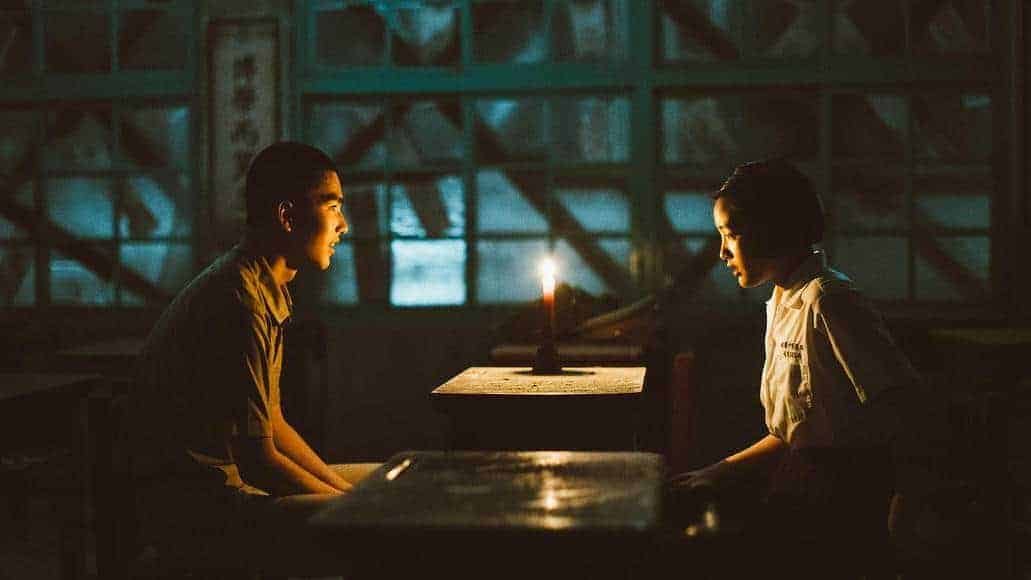
Would you say that Taiwan has recovered from the White Terror period?
I would not say it has recovered because there are still a lot of victims and survivors form that period, who do not really know what happened to their family members. We have this graveyard scene in the film, and the location is an actual place where political victims were buried. However, most of the gravestones just have a name on them but no one really knows who exactly is buried there, most of them were just killed and buried there by the officials. We are still working in making all the case files clearer and trying to find people who were involved. We have been working on this for more than a decade, but there is still a huge amount of work to be done, and we are still in the process of facing the truth.
Was it difficult combining a political drama with a supernatural thriller? Do you think that genre filmmaking offers a good approach to talk about political issues?
It has been quite challenging as well, since, if we were focusing too much on the political theme, than the film would be too serious to attract a wider audience. At the same time, we needed to make sure, even if the nature of this film was a psycho-horror one, that it was not just that. We needed to find the balance between these two factors, using a genre approach to communicate an important message. This balance also took us a while to figure out. I think that, in the end, this approach is more impactful than if it was a historical film, for example, or a drama. We felt that by using a genre approach we made the theme easier for the audience to approach.
The SFX in the film and particularly the monster is impressive. Can you tell us a bit about the creation and implementation in the film?
The monsters are in the game as well but we did an overhaul regarding the design of the monster, because the game entailed another visual element that we did not include in the film, Taoist religion, which added up to the whole dystopian setting. Nevertheless, we thought that if we added this religious element to the film, it might get too overwhelming for the audience. In the game, that monster was like a messenger from hell and we spent a lot of time redesigning and transforming it to someone who is more relatable to the whole political theme, the image of the instructor.
How was your cooperation with DP Chou Yi-hsien? In general, what was it you wanted to do in the visual aspect of the movie?
It was my first time working with Chou Yi-hsien. He is a very special DP. Although we had that whole storyboard of the film drawn before we started the production, he is the kind of DP that can always feel the atmosphere on set. During the shooting, he can always improve what he have designed and put it to the next level, so we needed to catch up with each other and find new solutions on how we would shoot each scene. The principal is that we wanted to create a new perspective to the story, one that we have rarely seen on Taiwanese films before. Therefore, we tried a lot of new stuff in order to figure out how to tell the story between the two dimensions.
Same question about Shieh Meng-ju's editing.
It was also my first time working with Shieh Meng-ju and the editing process took about one year, much longer than the average for a feature film. As I mentioned before, we spent a lot of time reconstructing the whole narrative and trying new stuff. It was a process of back and forth with each other, and there were some parts where I asked him to make his own version and I edited my own and then we combined the two. (laughs) It was really time- consuming and exhausting but it was also a lot of fun, we enjoyed this process.
Would you say that you are the one more responsible of the pace of the film or him?
A little bit of both. According to my taste, the pace might be a bit too slow, but Shieh Meng-ju's taste is closer to that of a wider audience, and I think it is good to have that kind of perspective. It is also very good that he is the kind of editor who is open to any kind of opinion; we both are actually, so we kept challenging each other, and fight with each other, but in the end, we found that middle ground within us too.
Gingle Wang is impressive as Fang. How did you guide her for the role?
We had a huge casting process, we basically interviewed every young Taiwanese actress. She was in another feature film project during the casting, but we still had an interview with her, even though she did not have the time. Actually, we had two interviews with her. In the first one, we were not sure if she fit the role, because most of her previous parts were more outgoing and more passionate, the exact opposite of the character we wanted. However, during the second interview, we started digging up her family and personal background, and realized there was a hidden part of her, darker than what she seemed like. It is like she is hiding this darker side in this outgoing look, and that is why we got interested in her and started digging up all we could extract from that kind of sensitive and insecure side of her during the process, and that is how we cast her in the end.
And what about Tseng Ching-hua, who plays Wei?
“Detention” is actually his first time as an actor. He is completely unfamiliar with how to perform as an actor; he had zero experience. However, I think it was during the first time we met him, what surprised me the most was that he is so pure, he is like someone who does not even know how to lie. We call this kind of actor “a white piece of paper”, completely empty, even transparent some times.
Not being able to lie seems like the opposite of acting.
(Laughing) Yes, we knew what kind of challenge we might face during the shooting but that kind of character is really special to me, because it is very rare to find someone who is this distant. We thought that might be a really good contrast to what Fang is. Because Fang, the main character, is more mature and sensitive compared to the boy, so it was like two completely different characters conflicting with each other. It was a bold choice and we did face many difficulties during the shooting, due to his lack of experience. However, when he was actually feeling that kind of emotion or affection we wanted for his character, you could feel how genuine and pure his performance was.
Hearing you say all these, I am curious. How much time did it took you to complete the film?
Two and a half years, when you count post production.
Can you give us some details about the locations the film was shot?
We spent a lot of time searching all the abandoned schools in Taiwan; surprisingly, there are a lot, because this generation of parents is having fewer kids. Some of the schools are empty and some of them have not been in use for decades. For example, the school the film is shot in is in the southern part of Taiwan, in an area where there is nothing else besides that building, which has been abandoned for 17 years. I remember the first time I entered that school, we were joking that we do not even need production design, because the school is already haunted. (laughs) It is literally in the middle of nowhere, there is only an abandoned hospital across the street, which made it scarier. (laughs)
What is your opinion regarding Taiwanese cinema at the moment?
I think that, during the last years, Taiwanese cinema has been transforming. We had the generation of the Taiwanese New Cinema from the 80s to the early 2000s, but after that, there was a downtime. By that time, the filmmakers were struggling, either with the box office or with how to break through and make something new, different from the New Cinema. It was not until the recent years that people started trying new stuff. For example, my education was from the generation of the Taiwanese New Cinema, our teachers were working with Hou Hsiao-hsen or Edward Yang or Tsai Ming-liang. My generation of filmmakers had this kind of background but also as kids raised in the 80s and 90s, we grew up with Hollywood, Japanese and Korean films. Right now, we are finding something in between and we also try to find new ways to tell stories, but we are still trying to figure out what to do. Especially the last two years, there have been a lot of new stuff coming out and I am looking forward to see this kind of change.
Are you working on anything new at the moment?
I am developing my next feature, but it is still at an early stage. It is actually a satire on Asian horror film genre. “Detention” is probably my most serious movie; most of my previous, short ones were crazy comedies or satires. Making “Detention” is some sort of exception for me, because I just loved this story so much, and I want to go back to my roots, which I am probably more familiar with. However, I want to use my experience on “Detention” as a sort of basis for my next projects.
Last question, do you still play video games?
Of course, all kinds of them. (laughs) It is just that when you have the luxury to buy those new consoles and PCs, you don't have the luxury of time.



